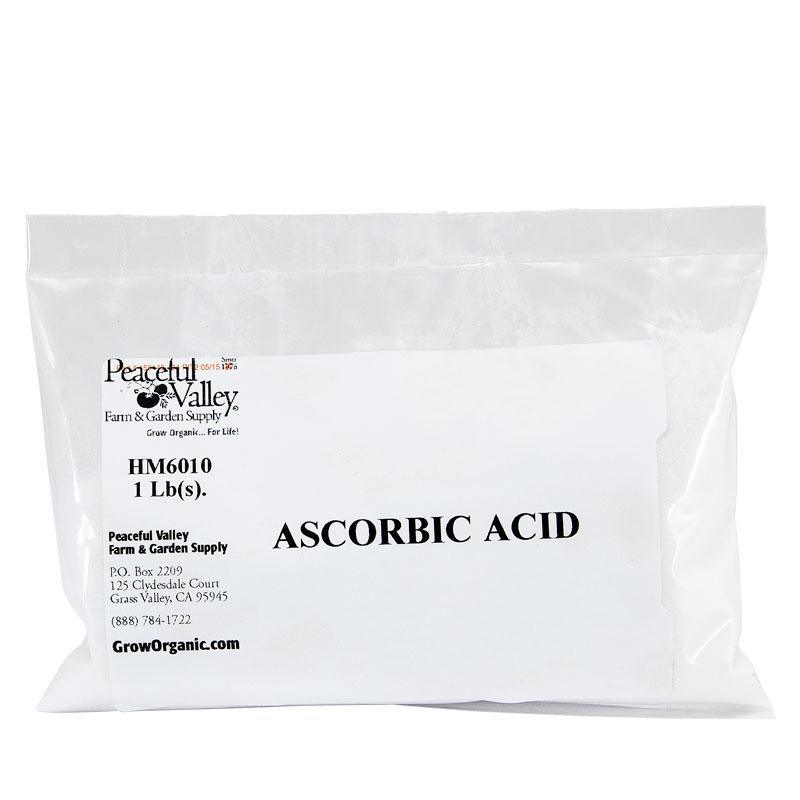Item Number: HM6010
99% Ascorbic Acid (lb)
Ascorbic Acid plays a significant role in the growth and development of plants and has several agricultural applications. Its importance in the plant world cannot be understated. Explore the benefits, applications, and potential advantages of using 99% Ascorbic Acid for crop cultivation.
- Stress Tolerance: Ascorbic Acid serves as a potent antioxidant in plants. It helps neutralize harmful free radicals and reactive oxygen species generated during environmental stress conditions, such as drought, heat, or exposure to pollutants. This antioxidant property enhances the plant's ability to withstand adverse environmental factors, thereby promoting overall stress tolerance and improving crop resilience.
- Photosynthesis Enhancement: Ascorbic Acid is involved in photosynthesis, the process by which plants convert sunlight into energy and produce carbohydrates. It aids in the regulation of electron transport chains and the protection of photosynthetic machinery, contributing to increased photosynthetic efficiency. As a result, the use of Ascorbic Acid can lead to improved plant growth and enhanced crop yields.
- Seed Germination: Treating seeds with Ascorbic Acid solutions before planting can accelerate germination and promote uniform seedling emergence. This can be particularly advantageous in agricultural practices where a quick and synchronized crop establishment is essential, such as in commercial farming.
- Root Development: Ascorbic Acid plays a crucial role in root growth and development. It stimulates root elongation and branching, which can result in increased nutrient and water uptake by plants. Strong and healthy root systems are vital for nutrient absorption and overall plant health.
- Flowering and Fruit Formation: Adequate levels of Ascorbic Acid in plants are associated with improved flowering and fruit set. It facilitates the formation of flowers and enhances the pollination process. Additionally, Ascorbic Acid promotes the development of larger and healthier fruit, which is a desirable trait for fruit growers.
- Disease Resistance: Ascorbic Acid contributes to the plant's defense mechanisms against diseases. It helps activate the plant's immune responses and strengthen its resistance to various pathogens, reducing the need for chemical pesticides and promoting sustainable agricultural practices.
- Post-Harvest Preservation: Ascorbic Acid can be used as a post-harvest treatment to extend the shelf life of harvested fruits and vegetables. It inhibits the browning of cut surfaces and helps maintain the freshness and quality of produce, reducing food waste and economic losses.
- Environmental Stress Mitigation: Ascorbic Acid can mitigate the harmful effects of soil salinity and heavy metal toxicity. It chelates heavy metals, making them less available to plants and preventing their accumulation. This property can be especially beneficial in areas with contaminated soils or high salinity levels.
- Fertilizer Synergy: When used in combination with fertilizers, Ascorbic Acid can enhance nutrient uptake by plants. It facilitates the conversion of certain nutrients into forms that are more readily absorbed by roots, improving the efficiency of nutrient utilization.
Ascorbic Acid has numerous agricultural uses and benefits that contribute to the growth, health, and productivity of plants. Its role as an antioxidant, stress mitigator, and growth enhancer makes it a valuable tool for modern agriculture, both in conventional and sustainable farming practices. As the agricultural industry continues to explore ways to optimize crop production while minimizing environmental impact, the applications of Ascorbic Acid in plant growth and agriculture are likely to expand, further enhancing our ability to meet the growing global food demand.
Check Your Zone Compatibility:
Compatible with your zone.
Growing Zone for

Our Guarantee To You
Since 1976, we've served our customers at every stage of growing. Please contact us at any time. We are happy to support and assist you.
Shipping Information
Shipping Information
Shipping Weight: 1.1 lb
Dimensions: 8.0"L x 7.5"W x 1.0"H
Features
Features
Characteristics
Characteristics
Use Instructions
Use Instructions
Useful Information
Useful Information
Guarantee
Guarantee
Share


